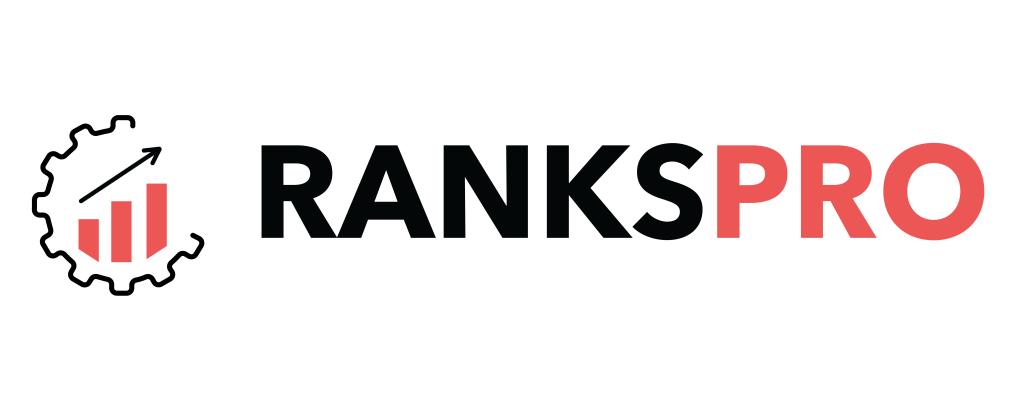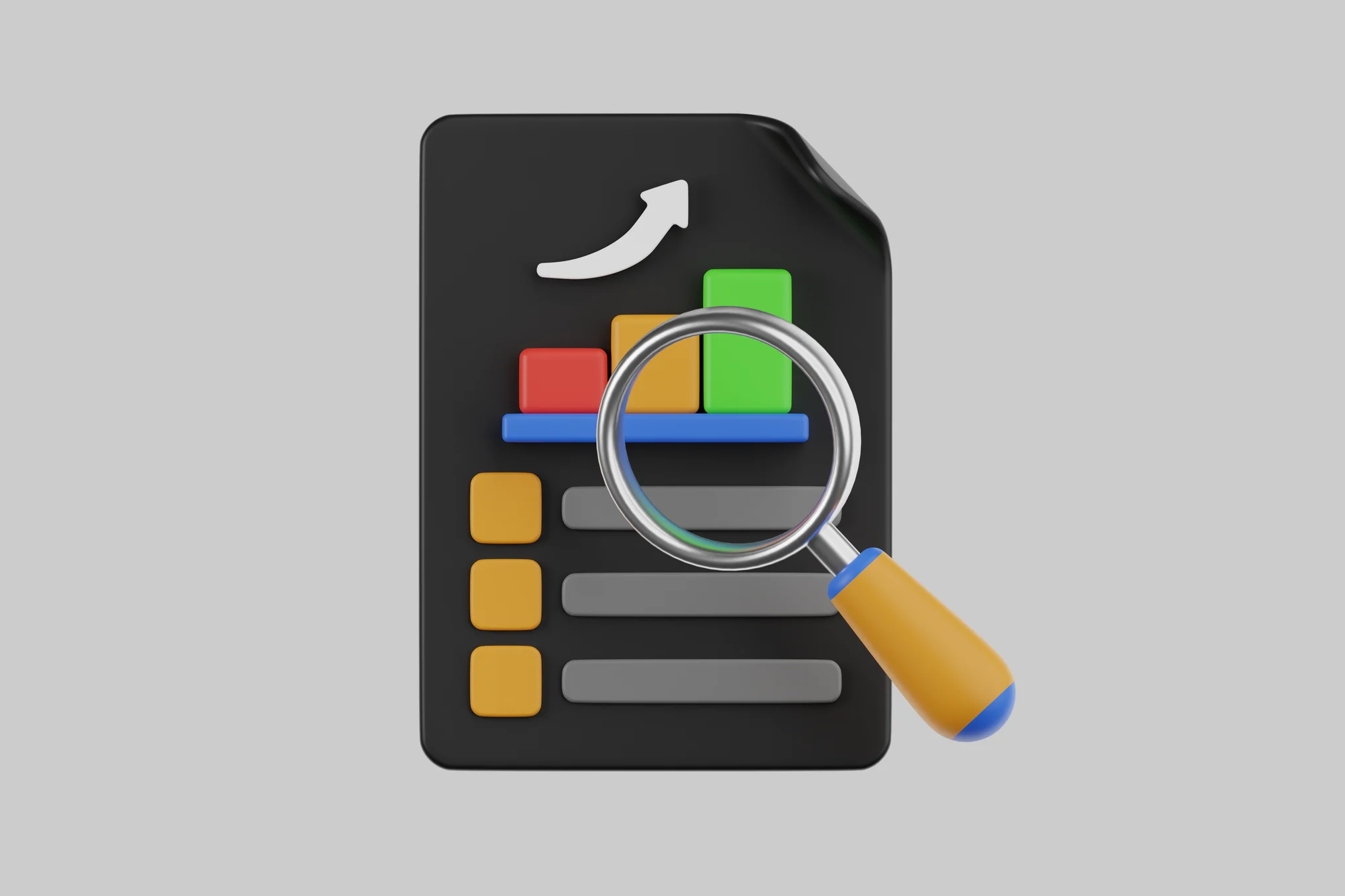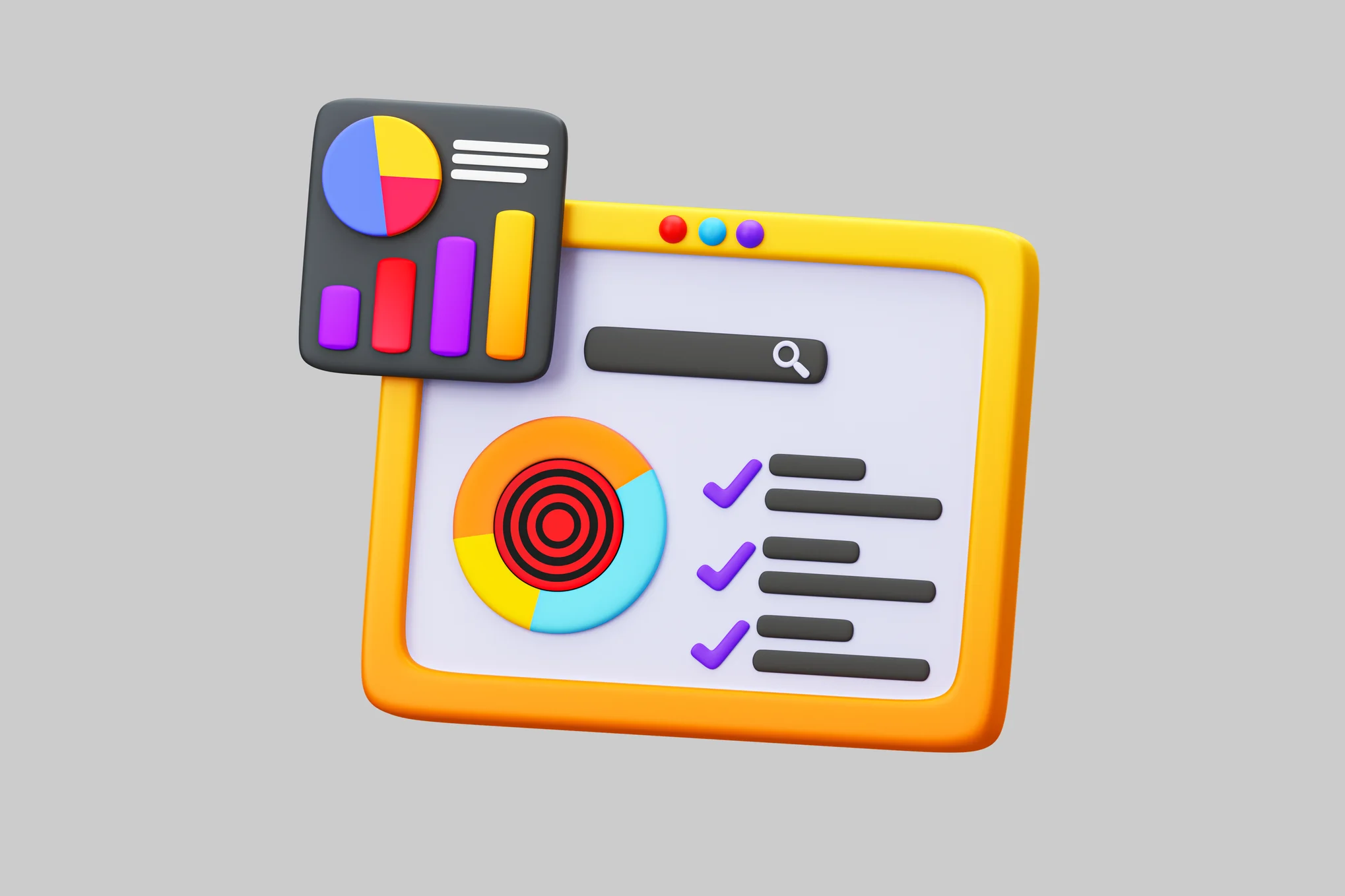In the ever-evolving landscape of digital marketing, one thing remains constant: the power of showing up when your audience is searching. And at the heart of that visibility lies a robust keyword research strategy.
With over 8.5 billion searches conducted on Google every single day, understanding what your audience is looking for is no longer a marketing tactic; it’s the very foundation of a successful online presence.
But with a sea of keyword research tools available, each promising a treasure trove of data, how do you choose the right one? The challenge is real. Some tools are perfect for a glance, while others are built for deep, methodical analysis.
This blog post is your comprehensive guide to the top 10 keyword research tools for in-depth research in 2025. We’ll explore their standout features, who they’re best suited for, and what to expect in terms of investment.
1. RanksPro
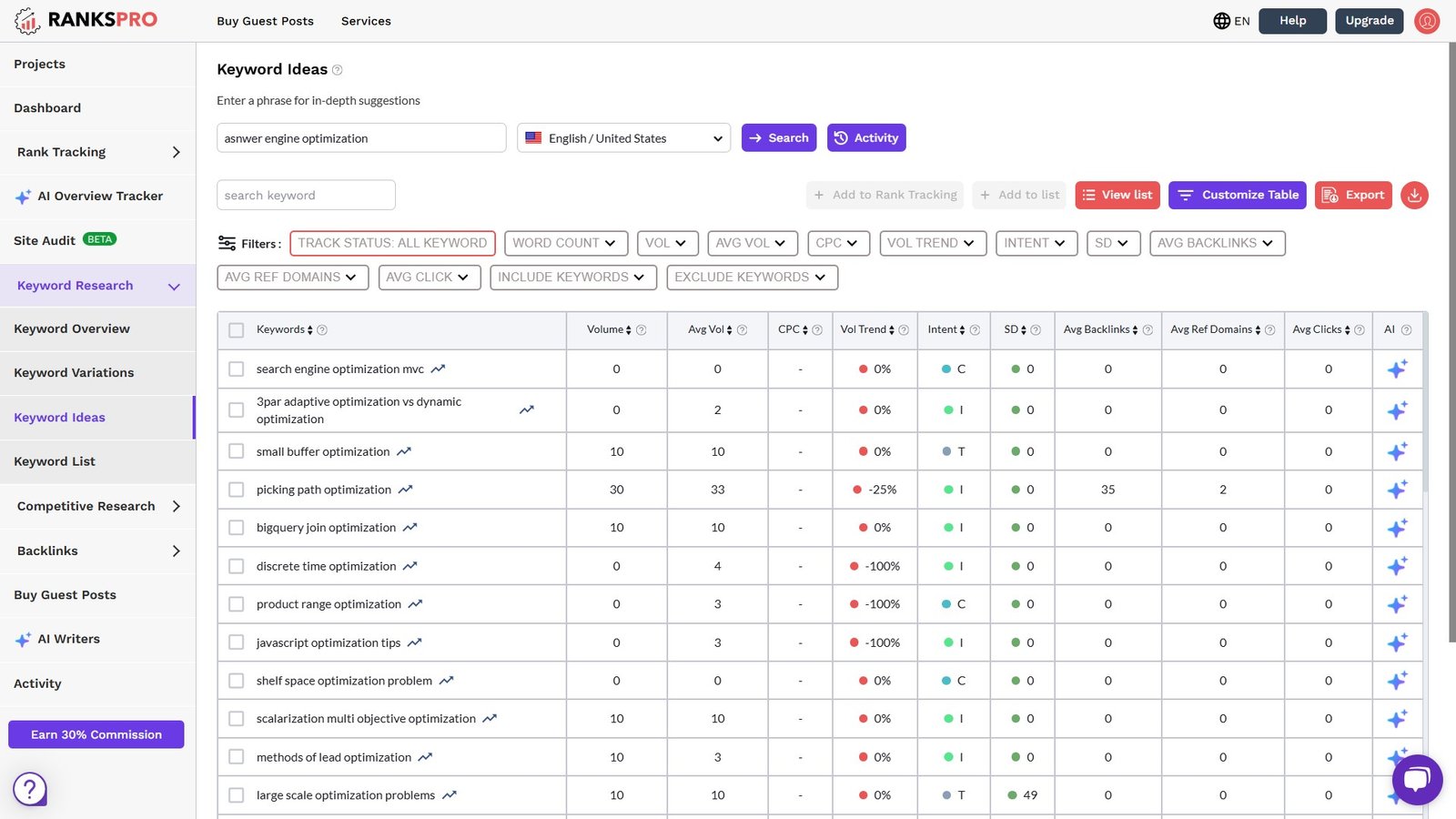
Built with AI-powered data insights and tailored for modern SEO professionals, RanksPro’s keyword research tool helps you uncover high-value, intent-driven keywords that drive traffic, conversions, and long-term visibility.
Whether you’re targeting local, national, or international audiences, RanksPro delivers smart suggestions, competitor-backed metrics, and user-focused keyword clustering—all from a clean, intuitive dashboard.
Top Keyword Research Features of RanksPro
- Advanced Keyword Suggestions: Get hundreds of keyword variations based on search intent, user queries, and trending topics—perfect for creating targeted content strategies.
- Search Volume & Keyword Difficulty: View precise monthly search volumes and difficulty scores, helping you prioritize low-competition, high-potential keywords.
- SERP Snapshot & Competitive Analysis: Analyze the top-ranking pages for each keyword to understand content gaps, backlink strength, and ranking difficulty.
- Keyword Clustering: Automatically group related keywords into semantic clusters, ideal for building content hubs and pillar pages.
- Geo-Specific Keyword Insights: Research keywords by country, region, or city to fine-tune your local SEO campaigns.
- AI Keyword Trends: Access trend graphs and predictive insights powered by AI, helping you capitalize on seasonal or rising search terms before your competitors.
Pros:
- Clean, beginner-friendly UI with expert-level depth
- Accurate and up-to-date keyword metrics
- Built-in clustering for strategic content planning
- Supports global and local keyword research
- Seamless integration with other SEO modules (Rank Tracking, Competitor Analysis)
Cons:
- Still growing its database in less common regions and languages
- Keyword trend analysis is available only in premium plans
Pricing: A 7-day free trial is available for users to test this tool. After that, users might need to pay $19 per month to use all the features.
2. Semrush
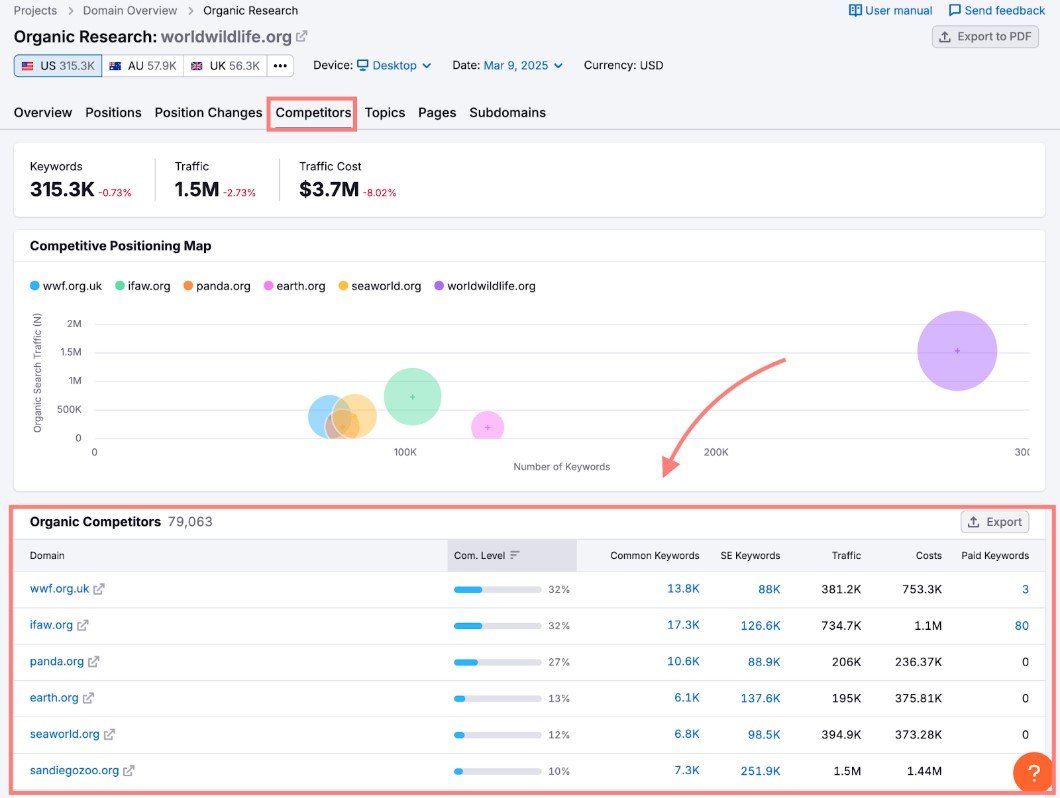
Semrush is an all-in-one marketing toolkit that offers a powerful suite of SEO tools, including an exceptional keyword research feature. With a massive database of over 25 billion keywords, Semrush provides a holistic view of your keyword landscape.
Key Features for In-depth Research:
- Keyword Magic Tool: It provides an extensive list of keyword suggestions grouped by topic, making it easy to discover long-tail keyword variations and build out your content pillars.
- Competitive Analysis: Semrush excels at showing you the keywords your competitors are ranking for. You can simply enter a competitor’s domain and get a list of their top organic and paid keywords.
- Keyword Gap Analysis: This feature allows you to compare your keyword profile with up to four competitors, revealing the keywords they rank for that you’re missing out on.
- Intent Analysis: Semrush categorizes keywords by intent (informational, navigational, commercial, and transactional), helping you create content that aligns with the user’s stage in the buyer’s journey.
Pros
- Extremely comprehensive keyword and SEO suite
- Offers keyword intent, SERP features, and trend insights
- Excellent for competitive keyword gap analysis
- Massive database with reliable search volume data
- Powerful integration with PPC tools
Cons
- Steeper learning curve for beginners
- Premium pricing, especially for freelancers or small teams
Pricing: The plans start from $117.33 per month, offering a 14-day free trial. It’s on the expensive side, that’s why most individuals look for Semrush alternatives.
3. Ahrefs
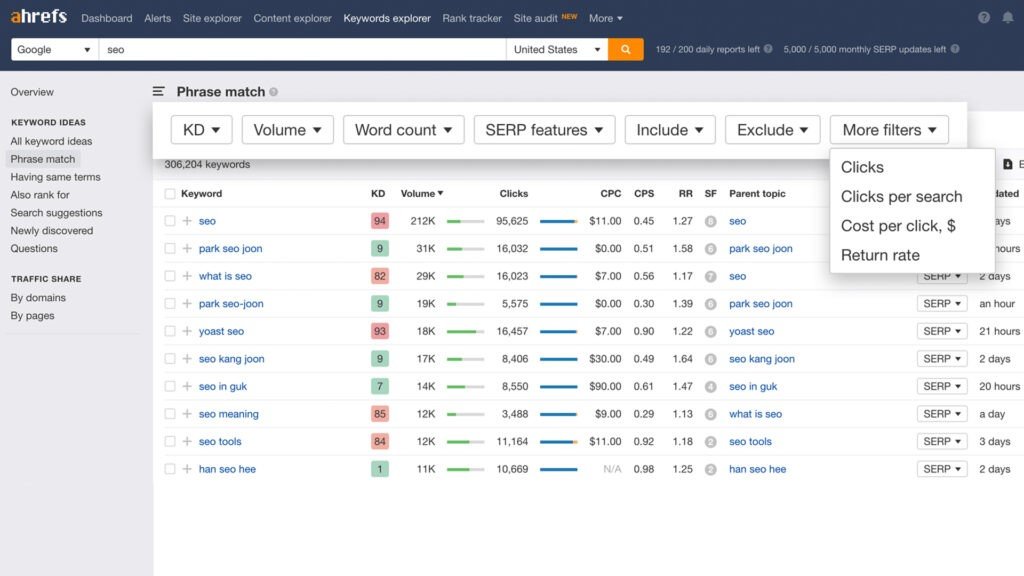
Ahrefs is another industry-leading all-in-one SEO platform renowned for its powerful backlink analysis and keyword research tools. It boasts a database of over 28 billion keywords and is a favorite among SEO professionals.
Key Features for In-depth Research:
- Keywords Explorer: Ahrefs’ Keywords Explorer provides in-depth data on keywords, including a unique “Clicks” metric that tells you how many clicks a keyword gets.
- Content Explorer: This tool helps you discover popular content in your niche, revealing the keywords that are driving traffic to top-performing articles and videos.
- SERP Overview: Ahrefs provides a detailed overview of the top-ranking pages for any keyword, giving you insights into the competition’s backlink profile, traffic, and more.
- Parent Topic: This feature helps you understand if you can rank for your target keyword while targeting a broader topic.
Pros:
- Highly accurate keyword difficulty and backlink correlation
- In-depth SERP analysis with historical data
- Great for long-tail and question-based keyword discovery
- Excellent content gap and top-ranking keyword analysis
Cons:
- No free plan available
- The interface is data-rich, which can be overwhelming for new users
Pricing: Ahrefs premium plans start from $129 per month, and there is no free trial. There are also cheaper alternatives to Ahrefs available, especially for startups and individuals.
4. SE Ranking
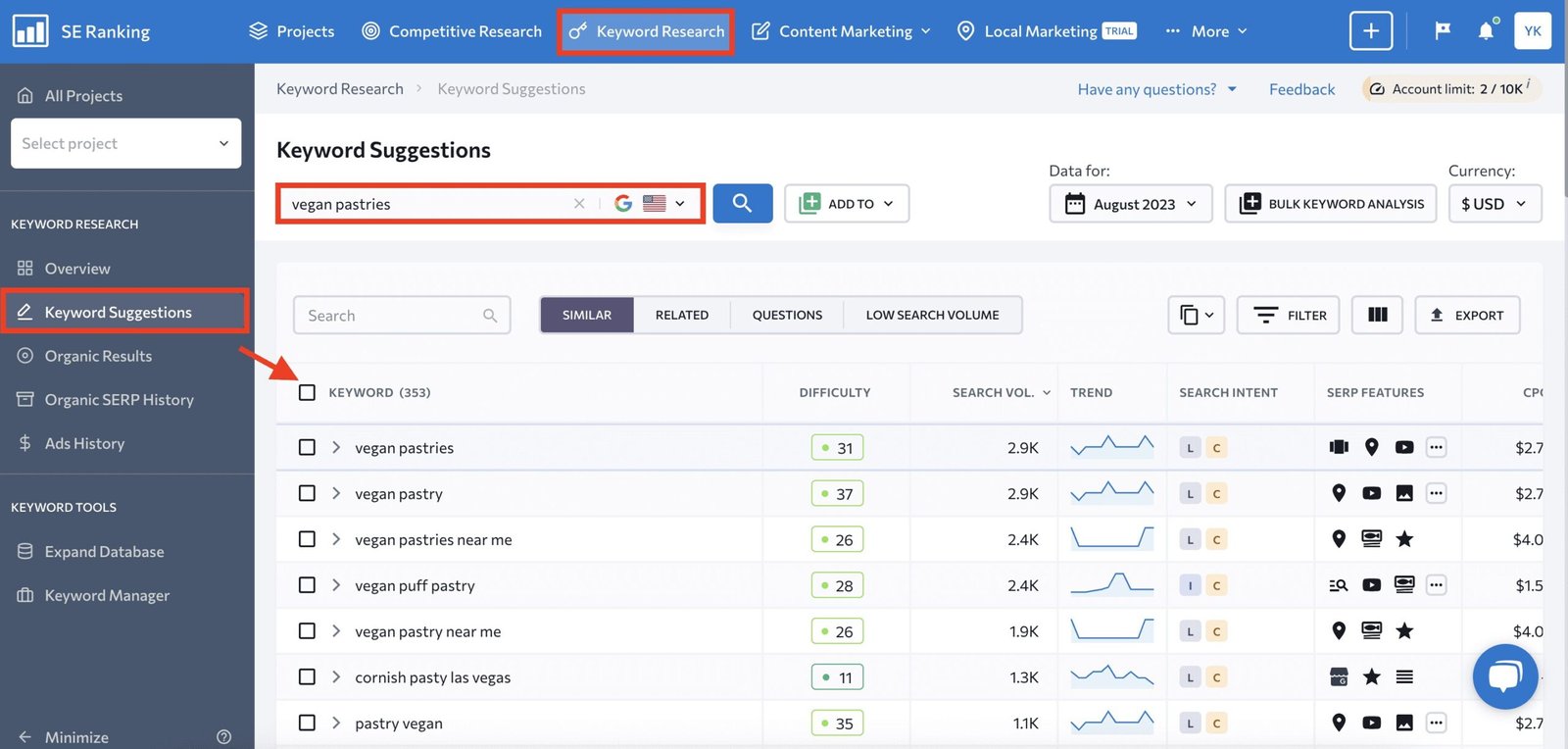
SE Ranking is a user-friendly and affordable all-in-one SEO platform that offers a robust set of tools, including a powerful keyword research tool. It’s a great option for those who want a comprehensive solution without the enterprise-level price tag.
Key Features for In-depth Research:
- Keyword Research Tool: SE Ranking provides all the essential keyword metrics, including search volume, difficulty, and CPC. It also offers a list of related and similar keywords.
- Competitive Research: It allows you to analyze your competitors’ keyword strategies, both organic and paid.
- Keyword Grouper: This tool helps you organize your keywords into clusters, making it easier to plan your content and site structure.
- Rank Tracker: SE Ranking’s rank tracker is highly accurate and allows you to monitor your keyword rankings across multiple search engines and locations.
Pros:
- Affordable and scalable for small to mid-sized businesses
- Offers reliable keyword rank tracking with competitor insights
- Includes keyword grouping and clustering tools
- Customizable SEO reports and local keyword research
Cons:
- The keyword database isn’t as vast as Semrush or Ahrefs
- UI can feel less modern in certain modules
Pricing: Plans start at a very competitive price point, $52 per month. It also offers a free trial for 14 days.
5. Mangools (KWFinder)
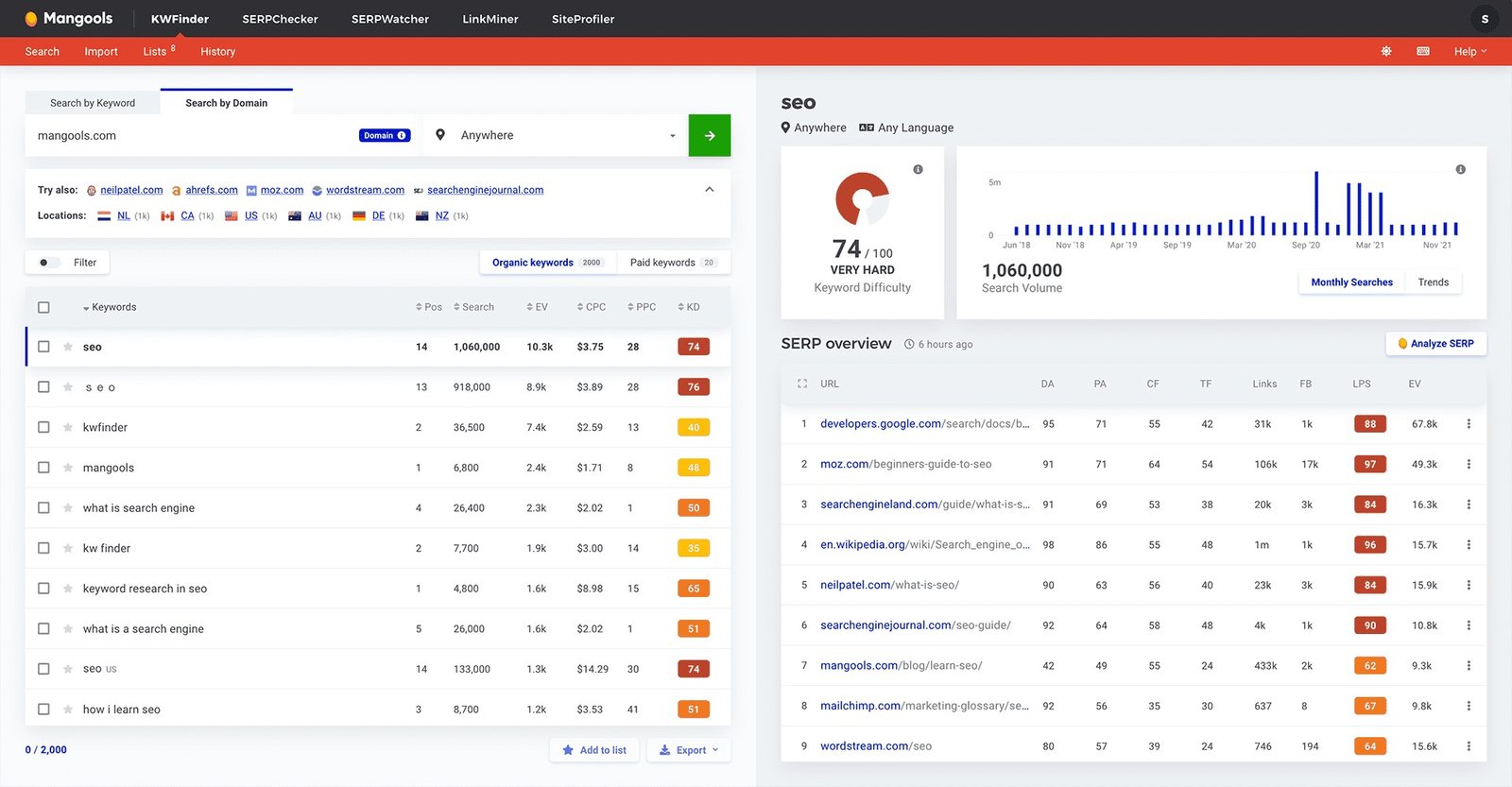
Mangools is a suite of five SEO tools, with KWFinder being its flagship keyword research tool. It’s known for its beautiful and intuitive interface, making it a favorite among beginners and those who want a streamlined experience.
Key Features for In-depth Research:
- KWFinder: This tool makes it incredibly easy to find long-tail keywords with low SEO difficulty. The “Keyword Difficulty” score is one of the most accurate in the industry.
- SERPChecker: This tool allows you to analyze the SERP for any keyword, providing you with over 45 SEO metrics for the top-ranking pages.
- Rank Tracking: Mangools also includes a rank tracker to monitor your progress for your target keywords.
Pros:
- Super intuitive and beginner-friendly interface
- Clear keyword difficulty scoring with visual graphs
- Ideal for niche websites and bloggers
- Budget-friendly pricing structure
Cons:
- Limited data depth compared to enterprise-level tools
- Fewer advanced SEO features outside of keyword research
Pricing: Plans are affordable as compared to other SEO tools, starting at around $24.50 per month.
6. Moz Keyword Explorer

Moz is a well-established name in the SEO industry, and its Keyword Explorer is a solid tool for keyword research. It provides a range of metrics to help you prioritize your keywords and plan your content strategy.
Key Features for In-depth Research:
- Keyword Suggestions: Moz provides a list of keyword suggestions for any seed keyword, with data on monthly search volume and difficulty.
- Organic CTR and Priority Score: These unique metrics help you estimate the potential click-through rate for a keyword and prioritize your efforts.
- SERP Analysis: Moz provides a detailed analysis of the SERP, showing you the top-ranking pages and their Domain Authority and Page Authority.
Pros:
- Strong keyword difficulty scoring backed by Page Authority metrics
- Easy-to-use with solid local SEO keyword tools
- Good for agencies with multiple clients
- Integrated site audits and SEO tools
Cons:
- Less frequent database updates than Ahrefs or Semrush
- Lacks advanced keyword clustering or AI-driven suggestions
Pricing: Access to Keyword Explorer is included in the Moz Pro subscription, which starts at $99 per month. It also has a 7-day free trial with complete access to every feature.
7. Google Keyword Planner
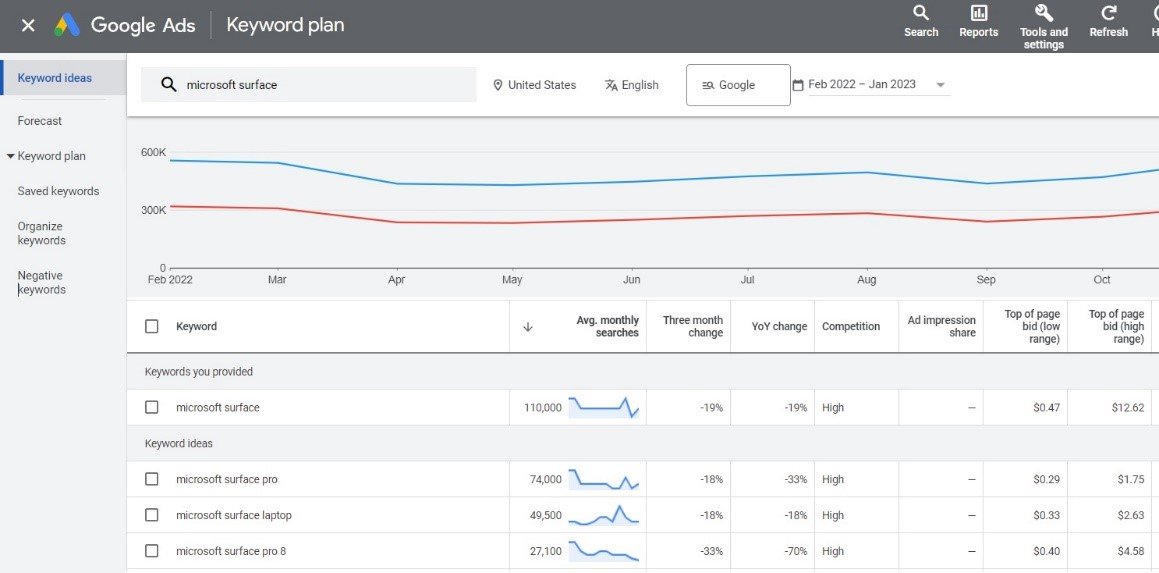
Google Keyword Planner is a free tool from Google that is primarily designed for advertisers. However, it can still be a valuable resource for SEO keyword research, especially when it comes to understanding search volume and competition for paid ads.
Key Features for In-depth Research:
- Discover New Keywords: You can enter a seed keyword or a website to get a list of keyword ideas.
- Get Search Volume and Forecasts: The tool provides data on monthly search volume, competition, and bid ranges for keywords.
Pros:
- 100% free with a Google Ads account
- Trusted source of real Google keyword data
- Helpful for paid ad targeting and estimating cost-per-click
- Great for high-level keyword discovery
Cons:
- Limited data precision without active ad spend
- No SEO-specific metrics like keyword difficulty or SERP analysis
Pricing: Free to use, but you need a Google Ads account.
8. AnswerThePublic
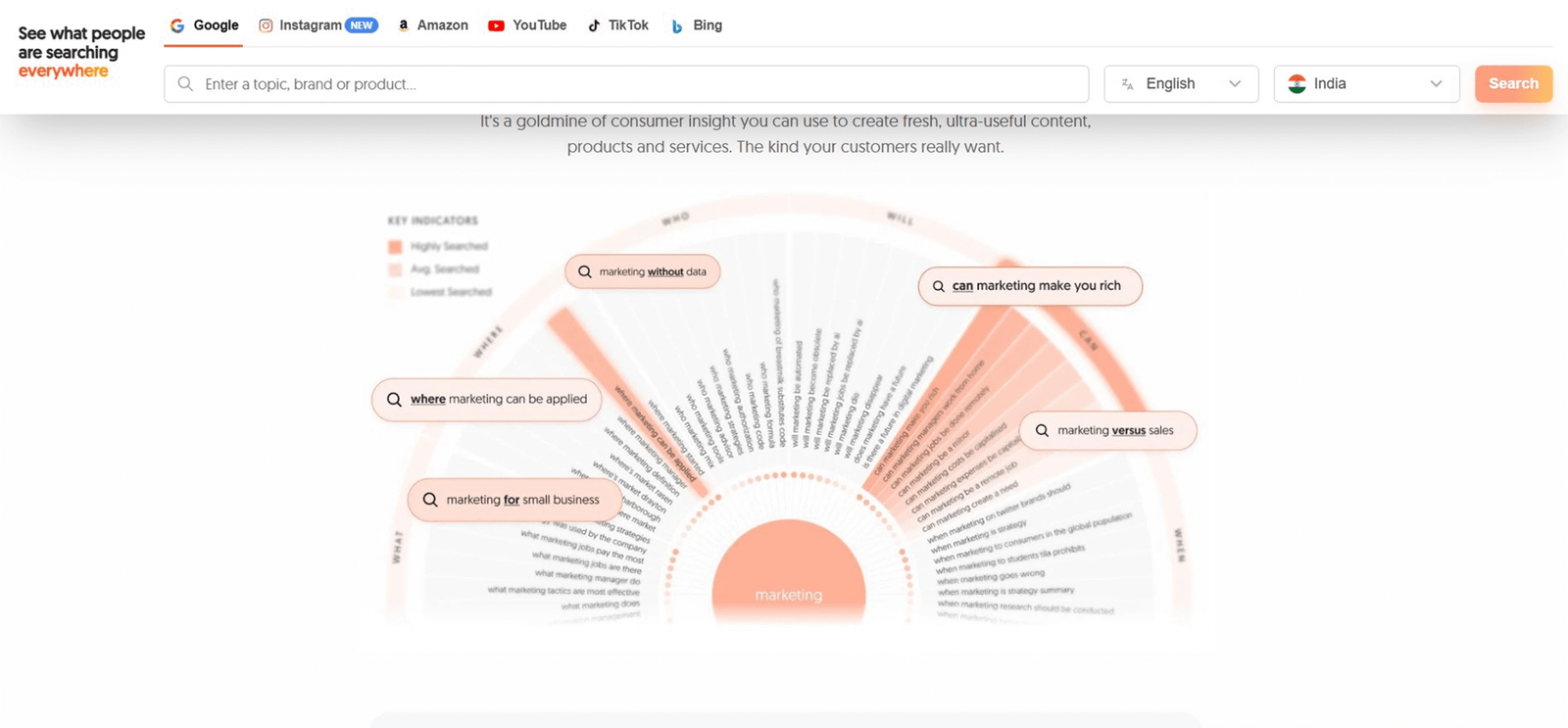
AnswerThePublic is a unique keyword research tool that visualizes search questions and queries in a “search cloud.” It’s a goldmine for understanding the questions your audience is asking.
Key Features for In-depth Research:
- Question-Based Keywords: The tool generates a massive list of questions based on your seed keyword, categorized by “who,” “what,” “where,” “when,” “why,” and “how.”
- Preposition and Comparison Keywords: It also provides keywords based on prepositions (e.g., “keyword research for beginners”) and comparisons (e.g., “Ahrefs vs. Semrush”).
Pros:
- Excellent for finding question-based, long-tail keywords
- Visual keyword maps make content brainstorming easier
- Perfect for blog content and voice search optimization
- Free version available with limited daily searches
Cons:
- Lacks metrics like search volume, difficulty, or trends
- No integration with broader SEO tools or competitor data
Pricing: A free version is available with limited daily searches. Paid plans offer unlimited searches and additional features, starting from $5 per month for a single user and $49 per month for up to 3 users.
9. Ubersuggest
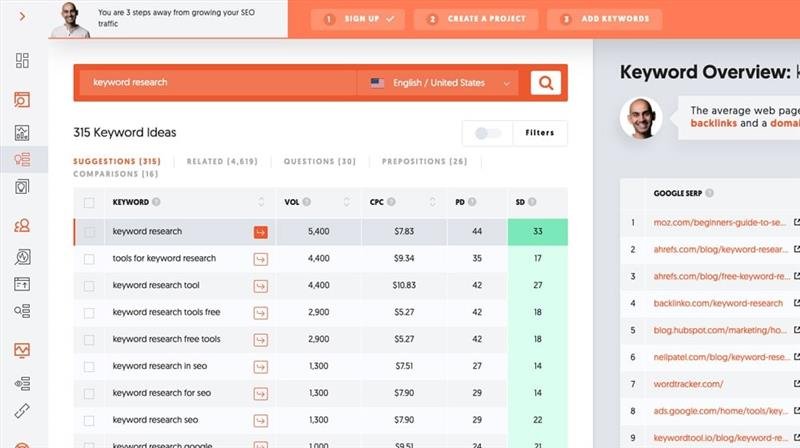
Ubersuggest, created by Neil Patel, is a freemium keyword research tool that has grown into a more comprehensive SEO platform. It offers a good range of features at an affordable price point.
Key Features for In-depth Research:
- Keyword Overview: Provides data on search volume, SEO difficulty, paid difficulty, and cost per click.
- Keyword Ideas: Generates a list of keyword suggestions, including related keywords, questions, prepositions, and comparisons.
- Content Ideas: Shows you top-performing content for your keyword, giving you ideas for your own content.
Pros:
- Beginner-friendly with a free plan and affordable pricing
- Includes keyword suggestions, difficulty, and basic SERP analysis
- Offers SEO audit, backlink, and content idea modules
- Good value for solopreneurs and small agencies
Cons:
- Keyword data is not as deep or current as premium tools
- Daily search limit on the free plan can be restrictive
Pricing: The free plan has restrictions, which might not be suitable for businesses and agencies. The paid plans start from $29 per month.
10. SpyFu
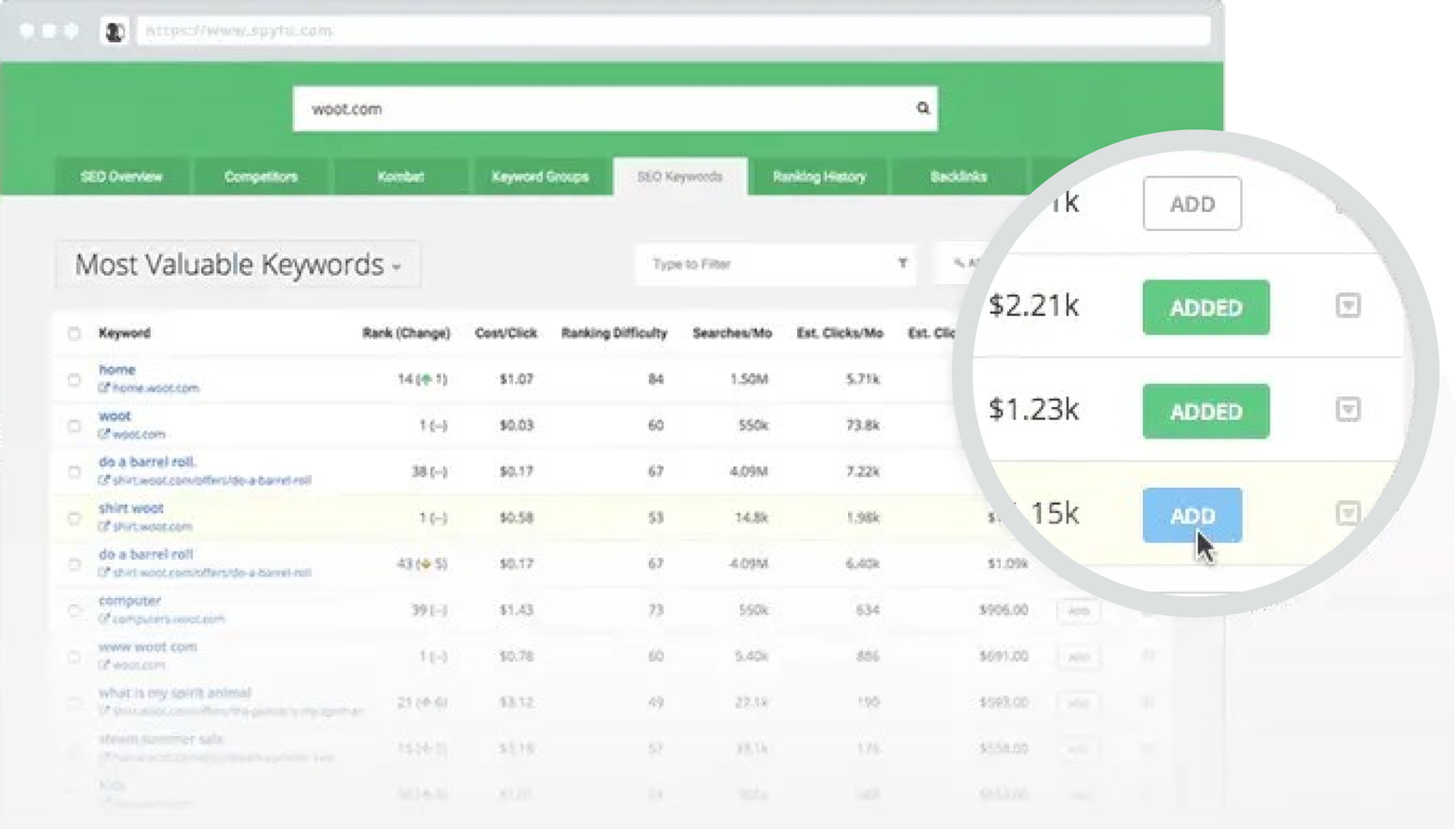
As the name suggests, SpyFu is a keyword research tool that is focused on competitor analysis. It allows you to “spy” on your competitors’ most profitable keywords and ad campaigns.
Key Features for In-depth Research:
- Competitor Keyword Research: You can enter a competitor’s domain and see their entire keyword history, both organic and paid.
- PPC Ad History: SpyFu shows you every ad your competitors have run on Google, giving you insights into their ad copy and strategy.
- Keyword Groups: The tool groups your competitors’ keywords into logical categories, helping you understand their content strategy.
Pros:
- Strong competitor keyword analysis and historical ad data
- Unlimited search results even on lower-tier plans
- Ideal for PPC + SEO keyword strategy
- Great for spying on competitors’ content and keyword strategies
Cons:
- Keyword suggestions are not as extensive or fresh as others
- The interface feels slightly dated compared to modern tools
Pricing: Plans are reasonably priced with $33 per month, making them accessible for most businesses.
How to Choose the Right Keyword Research Tool for You?
With so many great options, how do you choose the right one? Here are a few factors to consider:
- Your Budget: If you’re just starting, a free or freemium tool like Google Keyword Planner or Ubersuggest might be enough. If you have a larger budget, an all-in-one platform like RanksPro, Semrush, or Ahrefs is a worthy investment.
- Your Goals: Are you focused on finding long-tail keywords for your blog? A tool like KWFinder or AnswerThePublic might be the best fit. Are you trying to dominate the search results for competitive keywords? A more robust platform like RanksPro is what you need.
- Your Team Size: If you’re a solo marketer, a user-friendly tool like SE Ranking or Mangools will be easy to manage. If you’re part of a larger team, a platform with collaboration features like Semrush or Ahrefs is a better choice.
Final Thoughts
In-depth keyword research is the compass that guides your SEO and content marketing efforts. By understanding what your audience is searching for, you can create content that resonates, ranks, and drives results. The tools we’ve explored in this guide are your allies in this journey.
Whether you’re a seasoned SEO professional or just starting, there’s a tool out there that’s perfect for your needs. So, choose wisely, dig deep, and unlock the power of keyword research to achieve your online goals.
